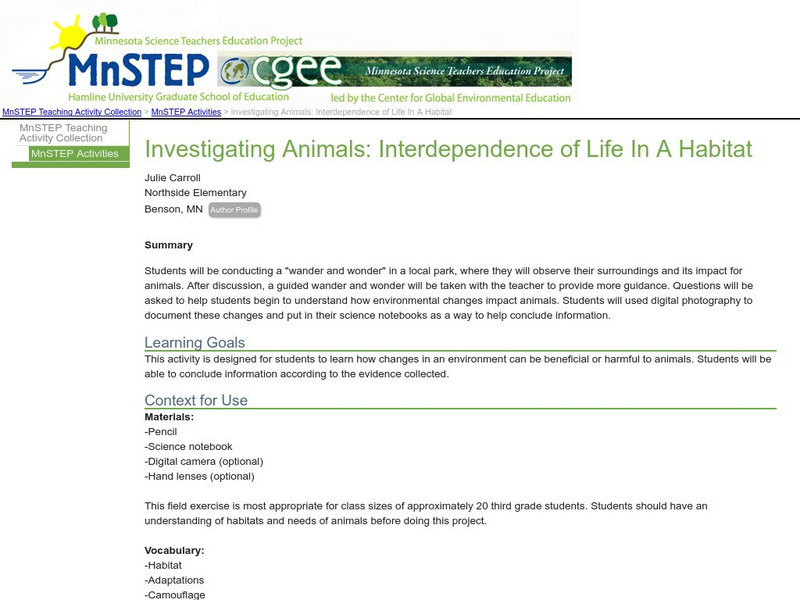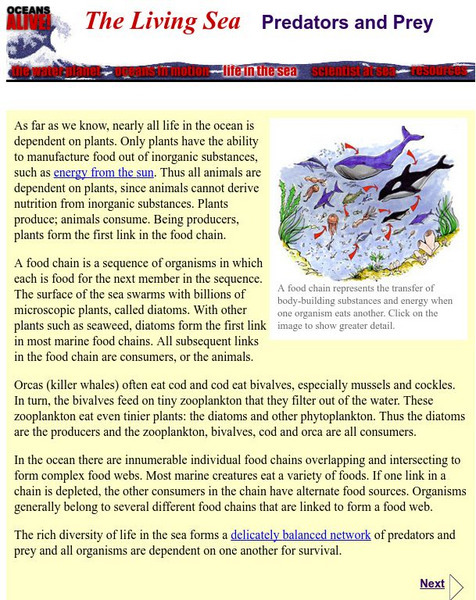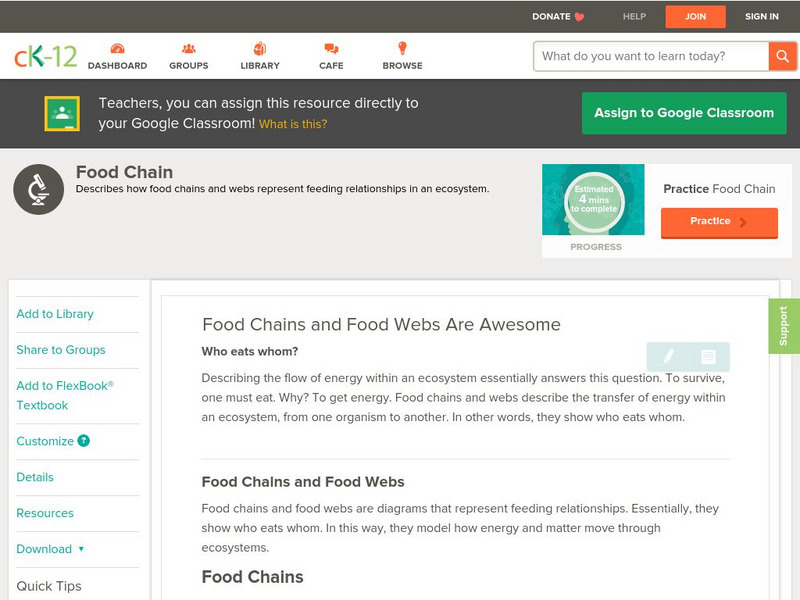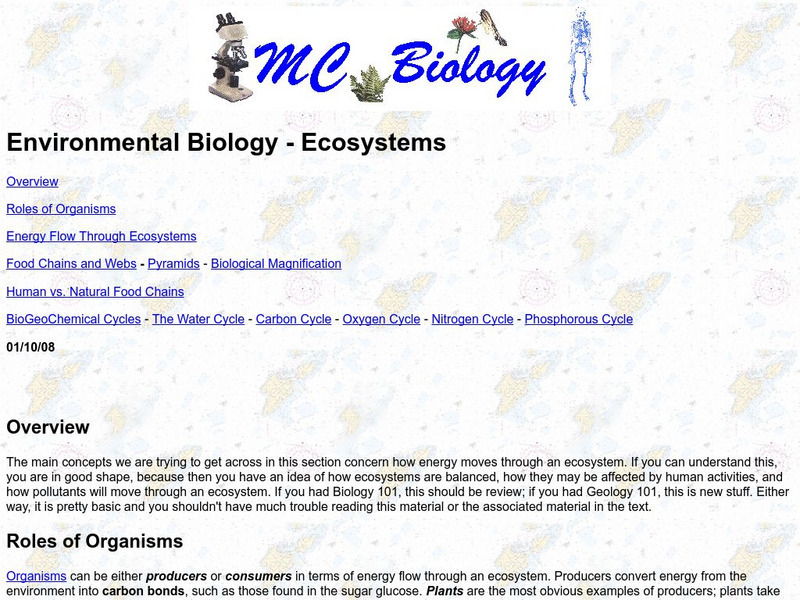Science Education Resource Center at Carleton College
Serc: Investigating Animals: Interdependence of Life in a Habitat
In this activity, students will learn how changes in nature can be beneficial or harmful to animals. At the end, students will be able to conclude information according to the evidence collected.
Bio Topics
Bio Topics: Ecological Pyramids
A colorful tutorial about ecological pyramids. Read the information, and then check your understanding with some questions and answers about the topic.
CK-12 Foundation
Ck 12: Life Science: Flow of Energy
[Free Registration/Login may be required to access all resource tools.] When an herbivore eats a plant, the energy in the plant tissues is used by the herbivore. Every time energy is transferred from one organism to another, there is a...
Other
Segfl: Sebastian Swan: Pond Web
This interactive ebook "Pond Web" demonstrates a pond food chain. Students can click on the ? to find answers to questions posed in the text. Students are asked to retell the story using pictures provided at the end of the book.
Defenders of Wildlife
Kids' Planet: The Web of Life
The Web of Life is a story told by a common garden spider at this site from Kids' Planet. Learn about the food web, and the roles and relationships of every living creature.
FT Exploring
Ft Exploring: The Flow of Energy Through Plants and Animals
Explore the different ecological roles of organisms in the ecosystem, and find out how the energy flows through them.
Museum of Science
Museum of Science: The Living Sea: Predators and Prey
This Museum of Science page does an excellent job of explaining the importance of plants as producers in the sea. The food chain or food web has to start with the plants.
CK-12 Foundation
Ck 12: Episd: Energy Pyramids
[Free Registration/Login may be required to access all resource tools.] Understand how energy flows within ecosystems through the use of energy pyramids.
CK-12 Foundation
Ck 12: Episd: Consumers and Decomposers
[Free Registration/Login may be required to access all resource tools.] Based upon the way organisms acquire their energy students will understand how to group them as consumers, decomposers or producers.
Other
Kidwings: Virtual Owl Pellet Dissection
A complete lesson on owl pellets. Students can read information, watch a tutorial, and use their computer mouse to complete a dissection simulation right there on the screen.
CK-12 Foundation
Ck 12: Biology: Food Chains and Food Webs
[Free Registration/Login may be required to access all resource tools.] Describes how food chains and webs represent feeding relationships.
Science Struck
Science Struck: A Bird's Eye View of the Desert Food Chain
Describes how a food chain works in a desert and how the Mojave desert food chain works in particular.
Science Struck
Science Struck: Food Chain in the Tundra Region
Describes the characteristics of a tundra biome, how a tundra food chain compares to a tropical food chain, and what the different trophic levels look like.
Sophia Learning
Sophia: The Role of Plants in the Food Chain: Lesson 2
This lesson explains the role plants play in the conversion of inorganic materials into organic material to support living things. It is 2 of 3 in the series titled "The Role of Plants in the Food Chain."
Sophia Learning
Sophia: The Role of Plants in the Food Chain: Lesson 3
This lesson explains the role plants play in the conversion of inorganic materials into organic material to support living things. It is 3 of 3 in the series titled "The Role of Plants in the Food Chain."
Science Struck
Science Struck: Examples of Primary Consumers in the Food Chain
Explains what a primary consumer's role in a food chain is and provides examples.
Science Struck
Science Struck: Tropical Rainforest Food Web
Explains what a food web is, the complexity of one in a rainforest, and how energy flows through a food web.
Sophia Learning
Sophia: Food Webs
A short lesson explaining the "web of interactions" that occur in a food web. Understand how the energy flows between autotrophs and consumers. [0:35]
Science Struck
Science Struck: Rainforest Food Web
Explains the characteristics of tropical and temperate rainforests and what rainforest food webs look like.
TeachEngineering
Teach Engineering: Go With the Energy Flow
Students learn about energy and nutrient flow in various biosphere climates and environments. They learn about herbivores, carnivores, omnivores, food chains and food webs, seeing the interdependence between producers, consumers and...
Texas Education Agency
Texas Gateway: Energy and Matter in Ecosystems
Learners analyze food chains, webs, and pyramids to determine how energy flows and matter cycles through ecosystems.
Other
Marietta College: Biology: Energy Flow Through the Ecosystem
Read to understand how energy and inorganic nutrients flow through a food chain in an ecosystem.
CK-12 Foundation
Ck 12: Biology: Trophic Levels
[Free Registration/Login may be required to access all resource tools.] Describes how to identify trophic levels in a food chain or food web.
Other popular searches
- Food Webs and Chains
- Ecology Food Webs Chains
- Food Webs and Food Chains
- Ocean Food Chains and Webs
- Food Webs Chains
- Food Webs Food Chains
- Food Webs, Food Chain


















